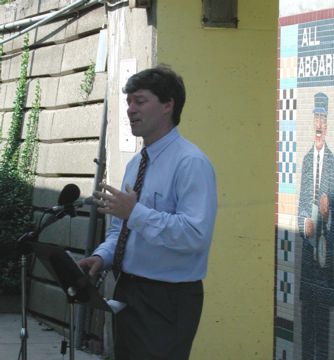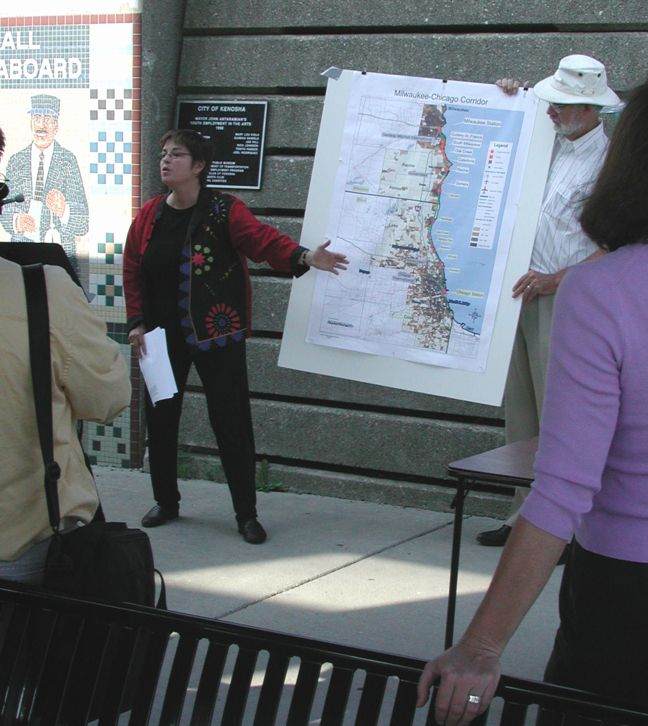As summer wound down to the end of August, little progress on the WISERIDE study of Kenosha-Racine-Milwaukee commuting infrastructure was evident. Not to casual obervers; not to Metra, watching from afar in Illinois; no progress evident even to KenRail members, who have sought extending commuter train service north from Kenosha along Union Pacific track near Lake Michigan since 1995.
However, progress continues in unheralded, sometimes subtle ways. On occasion that quiet WISERIDE progress toward achieving long-sought K-R-M commuter trains emerges briefly in prominent ways. One of those occasions was Tuesday, August 27, when significant support for K-R-M was publicly declared at a Kenosha news conference.
 Brett Hulsey, Challenge to Sprawl co-ordinator for Sierra Club and its Midwest Senior Representative, speaks about the aspects of the Club's "Smart Choices, Less Traffic" agenda which match with the K-R-M commuter rail extension.
Brett Hulsey, Challenge to Sprawl co-ordinator for Sierra Club and its Midwest Senior Representative, speaks about the aspects of the Club's "Smart Choices, Less Traffic" agenda which match with the K-R-M commuter rail extension.
K-R-M commuter trains would greatly improve travel such as his journey from Madison, Hulsey began, which presently requires departing the capital city before 6:00 am in order to reach Kenosha by 10:00 am. "We want to move this [K-R-M proposal] forward," Hulsey said. "We want to get trains and people moving (and) ... [e]xpanding this system should be our top priority.

TransitNOW executive director Rosemary Potter extols the many merits of K-R-M commuter trains to the audience, most of whom were familiar with its potential for traffic congestion mitigation and consequent air quality benefits. Sierra Club member Jay Warner assists, as he has since the inception of the K-R-M proposal, substituting for an unsteady easel while Sierra Club's Rosemary Wehnes (foreground) listens. Air pollution reduction is not sufficient by itself for justifying projects such as K-R-M, SEWRPC executive director Phil Evenson told Kenosha News. Because of the large investment required, because tens of millions of dollars must be spent wisely, the justification for a project must include financially measurable gains. Mr. Evenson called that a quantitative requirement, while agreeing that air quality concerns are "qualitatively" correct.
TransitNOW has been a leading proponent for the economic redevelopment aspects of K-R-M trains in combination with its well-understood advantages for easing reliance on automobiles for commuting and for the congestion and pollution arising from that single-mode of commuting to jobs in SE Wisconsin.
Visit TransitNOW webpage about K-R-M commuter trains
Visit Sierra Club website (click on Wisconsin in map for list of rated projects)
Return to KenRail home page